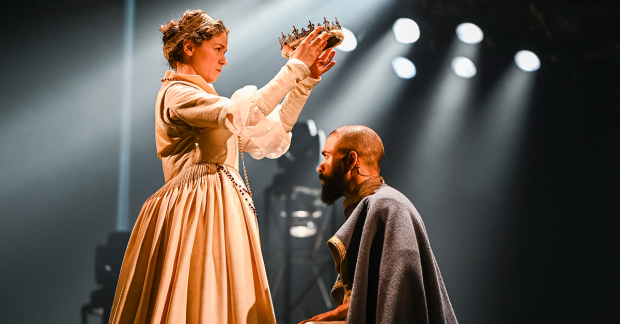Macbeth at Leeds Playhouse – review
A new production of Shakespeare’s tragedy premieres in Leeds

What can one say about a production of Macbeth that interpolates themes of pregnancy and miscarriage, plays tricks around the witches' involvement and cuts freely pretty much all the sober debate? Well, the most pertinent comment I heard in the interval was, "It's the name of the play that's wrong. If it wasn't called Macbeth, we'd all be saying how great it is."
And, to be fair to director Amy Leach, the essential storyline is untouched. We begin with a mighty drawbridge surrounded by a forest of iron, each of the iron trusses topped with a light that serves to punctuate the supernatural – for much of the play spotlights are the main means of illumination. The music is dramatic and edgy, brass and percussion. The witches gather to intercept Macbeth and Banquo – and the play is launched.
The first shock to the audience comes in the speaking which takes no account of iambic pentameter: in the first half, only the excellent Kammy Darweish (Duncan) and Jessica Baglow (Lady Macbeth) show any regard in this respect. Macbeth (Tachia Newall) and Banquo (Gabriel Paul) speak their lines as if they were prose and Macduff (Adam Bassett) communicates in British Sign Language, with Lennox acting as interpreter.
The first half ends with Macbeth and Lady Macbeth raised on high over their thanes, but in the second half, Leach's conception gradually takes hold, though still requiring wholesale cuts to bring it in at the two and a half hours including interval. Banquo's appearance at the royal feast is a fine moment, while the increasing power of Bassett's interpretation of Macduff begins to rivet our attention. But to create the time for his wounded-animal reaction to the news of his wife's death, it was necessary to butcher the England scene and his final confrontation with Macbeth.
Tachia Newall's titular turn finds drive in desperation in the second half and Jessica Baglow moves from cool queen through frantic hostess to wild-eyed suicide. Malcolm (Shahbaaz Khan), less obviously youthful than is common, registers with unusual authority. It would be inappropriate not to mention the exceptional quality of the two members of the Playhouse's Young Company who take the roles of Fleance and the Macduff child.
Reading associate director Benjamin Wilson's piece in the programme about feeling a second class audience member as a blind theatregoer convinced me of the wider need to involve audience members more fully in theatrical work. Now the question is, how does one reflect this in Shakespeare's text? Where does the line of authenticity lie, if exist at all? I don't know, but I do know that having startled me early on, this Macbeth finally hooked me as it always does.












